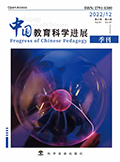

随着生态文明建设的深入推进, 生态文明教育在幼儿园教育中的地位日益凸显。幼儿园作为儿童成长的摇篮, 其教育内容和方式对于培养幼儿的环保意识和生态责任感具有深远的影响。本文旨在探讨生态文明教育与翠云廊古蜀道幼儿园研学课程的融合方式。通过文献分析、实地考察和问卷调查等方法, 深入挖掘翠云廊古蜀道文化资源的教育价值, 探讨幼儿园研学课程的设计与评价, 让幼儿亲身感受大自然的美丽与脆弱, 了解人类活动对自然环境的影响, 从而激发他们保护环境的责任感和使命感。这种融合方式不仅提高了幼儿的学习兴趣和参与度, 还促进了他们与自然的和谐共生。研究结果表明, 这种融合教育对于培养具有生态文明素养的新一代全面发展的人有重要意义, 幼儿对生态文明教育的兴趣与参与度提高、幼儿环保意识和行为习惯得到一定改善、幼儿创造力与解决问题能力有一定提升。因此, 幼儿园应积极探索和实践这种融合方式, 结合当地生态环境和文化特色, 设计丰富多样的研学课程, 为幼儿的全面发展奠定坚实基础。同时, 家长和社会也应积极参与和支持, 共同推动生态文明教育的深入发展。
With the deepening of ecological civilization construction, the role of ecological civilization education in kindergarten education is increasingly pivotal. As the cradle of children's growth, kindergarten is of far-reaching influence on cultivating children's environmental awareness and ecological responsibility through its education contents and methods. The purpose of this paper is to explore the integration of ecological civilization education and the research course of Cuiyunlang Ancient Shudao Kindergarten. Through literature analysis, field investigations, and questionnaire surveys, this paper has explored the educational value of the cultural resources of Cuiyunlang ancient Shudao, and has probed into the design and evaluation of the research courses in kindergartens in the view of enabling the kids to experience the beauty and fragility of nature firsthand, to understand the impact of human activities on the natural environment, so as tostimulate their sense of responsibility and mission in protecting the environment. This integration approach not only enhances kid’s learning interest and participation, but also promotes their sense of harmonious symbiosis with nature. The research results indicate that this integrated education is of great significance for cultivating a new generation of well-rounded individuals with ecological civilization literacy. Under such integrated education, children's interest and participation in ecological civilization education have increased, their environmental awareness and behavior. habits have been improved, and their creativity and problemsolving ability have been enhanced. Therefore, kindergartens should actively explore and practice this kind of integration method, combining local ecological environment and cultural characteristics to design rich and diverse research courses, and lay a solid foundation for the comprehensive development of young children. At the same time, parents and society should actively participate and support to jointly promote the in-depth development of ecological civilization education.